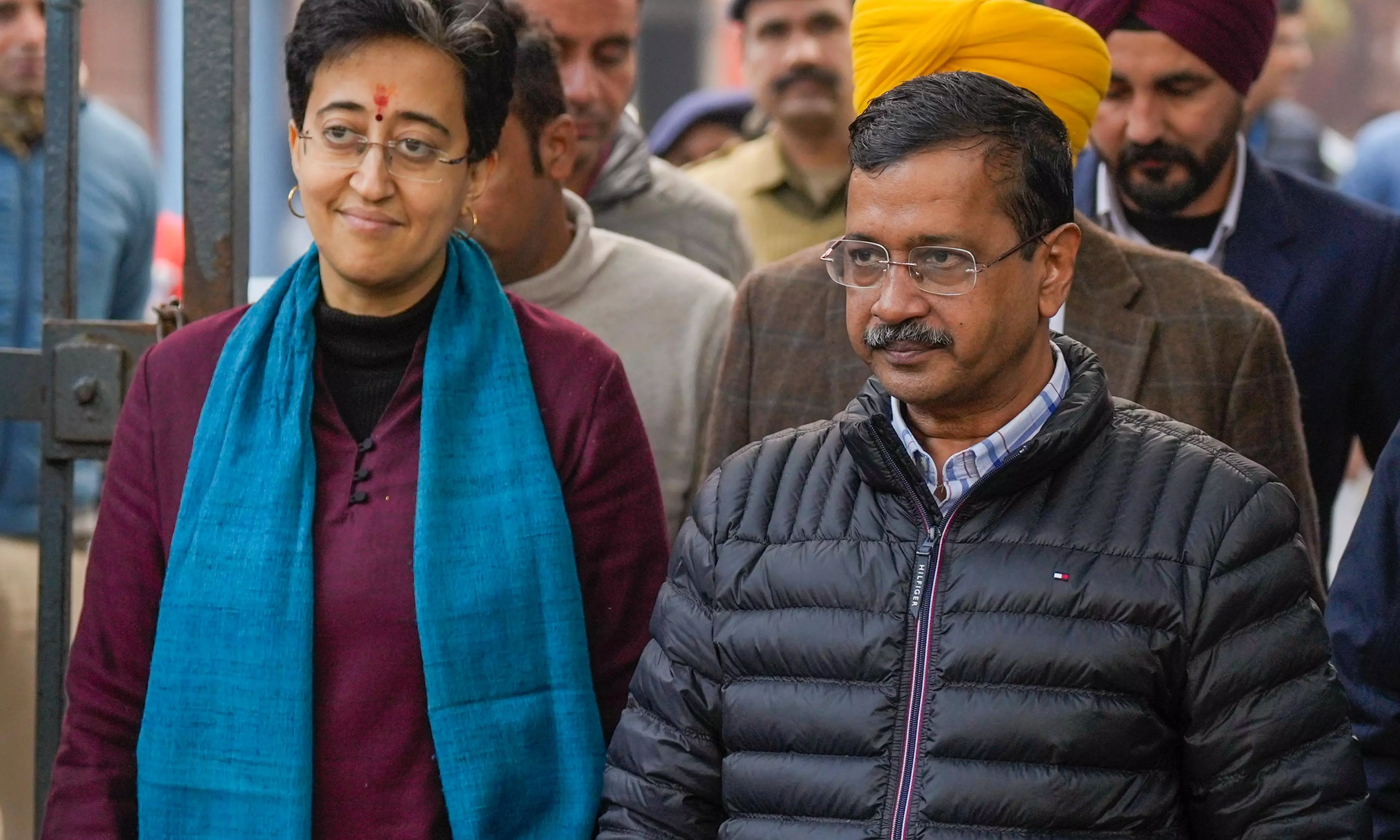
AAP national convener Arvind Kejriwal with Delhi Chief Minister and party leader Atishi leaves from the Election Commission office, in New Delhi, Monday, January 13. PTI
Decoding Delhi election: Who has edge in high-stakes battle?
Delhi polls heat up as AAP, BJP, and Congress vie for dominance. Is it a bipolar or triangular contest? Stakes are high for all three. Who’ll emerge victorious?

The latest episode of Talking Sense With Srini analysed the Delhi Assembly elections with insights from S Srinivasan, Editor-in-Chief of The Federal. With three major parties – AAP, BJP, and Congress – competing for control, the electoral battle in Delhi holds significant importance for all stakeholders. The prestige associated with this election underscores its critical nature for the parties involved.
For Congress, the election represents an existential challenge. The party, which once dominated the national capital under Sheila Dikshit’s leadership, now struggles with diminishing relevance. Its vote share, which plummeted to 4.3 per cent in 2020, illustrates its dire situation as it attempts to regain lost ground in a city where it has been overshadowed by AAP.
BJP’s long Delhi drought
Despite its dominance at the national level, the BJP has faced consistent challenges in Delhi. The party has failed to secure the national capital for over two decades, even with the Central government and key leadership based in the city. Although its vote share has remained steady at over 30 per cent in recent years, this has not translated into electoral victories, reflecting its inability to counter AAP’s appeal effectively, Srinivasan noted.
Also read: FIR against AAP for posting AI-generated videos of Modi, Shah on X
Winning Delhi is seen as a crucial objective for the BJP, particularly after setbacks in other polls. A victory here would serve as a significant morale boost and reinforce the party’s position in national politics. However, BJP’s limited impact in constituencies with large Dalit and minority populations remains a hurdle.
AAP’s decade of dominance
Over the last decade, AAP has solidified its position as the leading party in Delhi under Arvind Kejriwal’s leadership. Its rise was fueled by a strong anti-corruption agenda and targeted welfare schemes such as subsidised electricity, water, improved government schools, and mohalla clinics. These initiatives have resonated particularly well with marginalised communities, including slum dwellers and auto drivers, contributing to AAP’s consistent success.
Also read: Kejriwal claims BJP buying votes; 'King of lies', says Manoj Tiwari
However, the party now faces the challenge of combating potential anti-incumbency after a decade in power. Despite changing trends in voter behavior across India, sustaining its dominance requires AAP to reinforce its relevance and performance.
The impact of Congress’s revival
A potential revival of Congress could alter the electoral dynamics, possibly transforming the contest from a bipolar to a triangular one. An increase in Congress’s vote share could lead to a division in the anti-BJP vote, indirectly benefiting BJP’s prospects. This dynamic poses a challenge for AAP, which has relied on a consolidated voter base to maintain its stronghold.
Revdi culture and fiscal challenges
The issue of freebies in Indian politics, often referred to as “Revdi Culture”, has become a central theme in this election. Although criticised for its impact on fiscal prudence, the practice continues to be a popular strategy among political parties. In Delhi, parties have announced schemes ranging from cash incentives for women to free public services, further intensifying the competition.
Also watch | Delhi polls: 'It's a Catch-22 situation for Congress'
While such promises are designed to attract voters, their long-term sustainability raises concerns. For instance, the financial implications of these schemes could strain Delhi’s budget significantly, potentially impacting the city’s governance and development priorities
As the elections approach, Delhi stands as a microcosm of India’s evolving political landscape. The interactions between AAP, BJP, and Congress will not only shape the capital’s governance but also provide insights into broader national trends. The outcome of this high-stakes contest remains uncertain, with each party striving to leave a lasting impact.
The content above has been generated using a fine-tuned AI model. To ensure accuracy, quality, and editorial integrity, we employ a Human-In-The-Loop (HITL) process. While AI assists in creating the initial draft, our experienced editorial team carefully reviews, edits, and refines the content before publication. At The Federal, we combine the efficiency of AI with the expertise of human editors to deliver reliable and insightful journalism.

